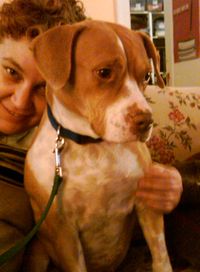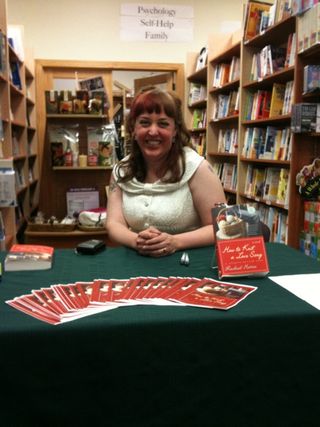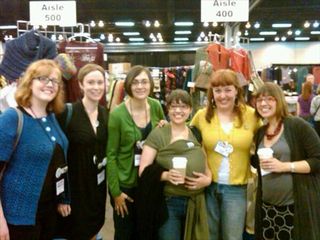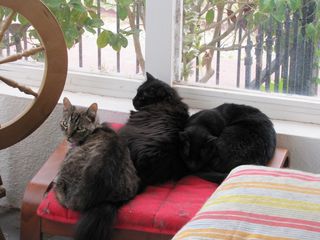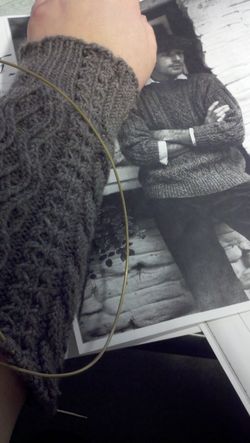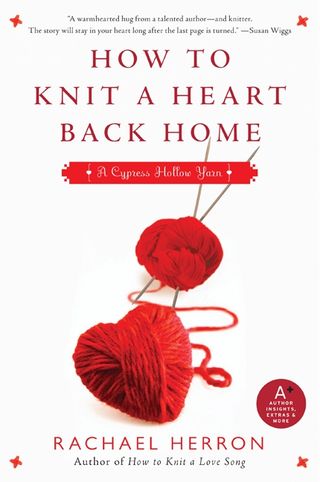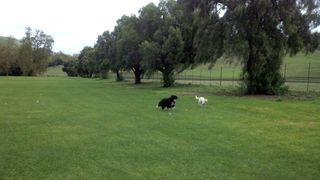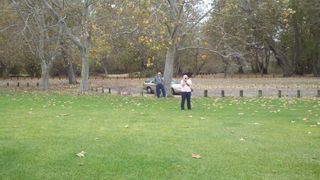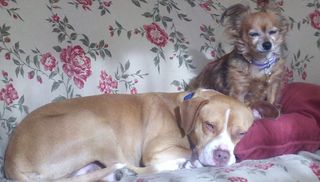Last week, when we were out eating sushi, Lala asked me, "Where do you get your ideas?"
I thought, Oh, please. Do we need to search this hard for a small-talk topic? (I was in a mood.) Then I said, generically, "Ideas are everywhere." I didn't know she actually wanted to know.
Then on Friday night, we hung out in the kitchen and had a three hour conversation about creativity that was just about the most fun I've had in conversation in a long time.
She's an artist, see. A really good one. In fact, when I think of her and creativity, I think of her art even before her music. And she's been thinking a lot about creativity in general, and had some questions, which I was astonished to find I could answer (for myself at least — creativity is, of course, a strange, fickle beastie and is different for everyone).
I've wanted to write since I could hold a pencil. But it's only been the last four years that I've pushed it, and in 2010, I pushed myself further than I'd gone before in terms of channeling ideas into concrete Things (books), and I guess I've learned some things, in spite of myself.
1) Creativity within constraints. I'm 38, and from the time I was a child up until I was 34, this is how I thought about writing (and this includes while I was doing my MFA work): I want to write. I want to write, oh, about love, and a tree with a woman under it, and a SAD feeling, with joy to follow, and oh, it's so pretty. Then I'd pick up my pen or open a blank document and go, GAWP.
If you sit down and try to write a book (or paint a picture or knit a sweater, for that matter), you have to have some idea where you're going, right? But how do you GET to that point? Say I want to write about a young woman with a rare disease who learns how to charm snakes. But I also want to write the dancing-monkey-in-Burma book that's been flitting around my head. And I also can't let go of the Venetian gondolier story that keeps knocking at the window of my brain. If I go with the rare-disease-girl book, HOW DO I KNOW I'M RIGHT? What if this fails, what if I'm totally wrong, and I never finish it, or worse, I do and it sucks, and all the time, I should have been writing about the monkey?
How do you make decisions about where to chase that creative impulse?
You just decide. That's it. Your choice, by the way, will be wrong. By choosing it, you will NOT be able to chase those other ideas, and because you didn't, they will never come to life the way they would have if you'd started them now. It's okay for that to hurt while you work on accepting it.
But whatever you choose will also be right. You know why? Because you will make it right. If you narrow yourself down to something (really, anything), you will get something done. If I just sit down and write the snake charmer story, it won't be everything I thought or hoped, but in many ways it will be a million times better, and THEN I'll be able to move on to the Venetian gondolier. And in the meantime, I've kind of decided it might be a female gondolier (gasp!) and I wouldn't have thought of that if I'd started it six months ago.
Pick something. Decide. Even if you have to do it arbitrarily, decide. Narrow your options (make someone else do it for you if you can't). Then do it.
2) Give Yourself Permission to Navel-Gaze. Even if you're not writing a memoir or painting a self-portrait, there will be that moment of horror when you realize, OH MY GOD I'm just writing about myself, and I'm the most narcissistic, solipsistic, self-indulgent person EVER.
Lala had a taste of terror about this, which is how it came up–she does NOT want to talk about herself in her drawing. She's fine talking about herself in casual conversation, but to base art on herself? How could she do that? But seriously, moments in her life SCREAM to be drawn in comic form. So. How does one allow oneself to go there? When is it okay to say, "I'm going to use MYSELF for this model?"
First, it helps to stay honest. The more honest I go with my work, the more embarrassing it is, which leads me to think I'm not tooting my own horn: I'm actually turning the floodlights on the chipped, faded, broken parts. And that's okay. (Just as okay as shining the light on the great, glowing, pretty parts. But in my own work, I don't find that as funny, which is what I enjoy writing more.)
It doesn't feel great to have this worry. But it's normal. Feel that way, then accept it, and keep working. You only know one person–body, mind, and soul–and that's you. Why wouldn't you bring that into your story? You SHOULD. And it's okay.
3) Give yourself permission to suck. I know you've heard this before, and I know that every time I heard it I'd nod and agree, and then when I actually DID suck, I'd beat myself up and throw the words away. What I really thought was that it was okay for everyone else to suck, but not for me.
That's ridiculous. The first draft is always ass, as is (probably) the first sketch of something. How do you know how something should really look if you don't (really) know what it wants to be yet? Let it suck. And this is important: If you have to leave it there, leave it behind, sucking in its devastating awfulness? Leave it behind. I wrote two drafts of the book I'm finishing rewrites on that don't even COUNT because they didn't work (I do count the 1/4 book I've subtracted from the current words while revising). I'd actually completely forgotten I'd written those first two drafts (they were about small-town mechanics. Now it's a doctor book. Completely, from-the-ground-up different, but their bones lie beneath the foundation of the book's structure, and I need them there for stability).
4) No excuses. You've also heard this before, but it's at this point that I get all tough-love from my bloggity-soapbox. If you want to write, write. If you want to draw, draw. If you want to create anything, do it and quit talking about it. There are a billion people who know they have books/art in them, and they'll tell you all about their ideas, and yet they never write/draw a thing. And in the end, they won't. After all, "How you spend your days is how you spend your life." (–Annie Dillard, thanks to Sarah for reminding me who said it!) If that isn't a chilling/thrilling reminder, I don't know what is.
But you can.
No one is too busy. YOU are not too busy to write for ten minutes a day. Five, if that's all you've got (but you have more, I know you do). John Scalzi says it so well (from this excellent article):
Do you want to write or don’t you? If your answer is “yes, but,” then here’s a small editing tip: what you’re doing is using six letters and two words to say “no.” And that’s fine. Just don’t kid yourself as to what “yes, but” means.
So.
I've learned this: I love to write. I need to write. And more, I need to push myself to work. When I'm accountable to myself, it's so flipping worth it. It's also SO OFTEN no fun, but sometimes it's the most exciting thing in the world. I've made myself laugh so many times while writing things I never saw coming, and five or six times I've made myself cry (which is kind of ridiculous and makes me think of Joan Wilder in that first great Romancing the Stone scene), and I love it. I love this life. If you're drawn to the artistic, then MAKE ART. And have fun. Do it.
